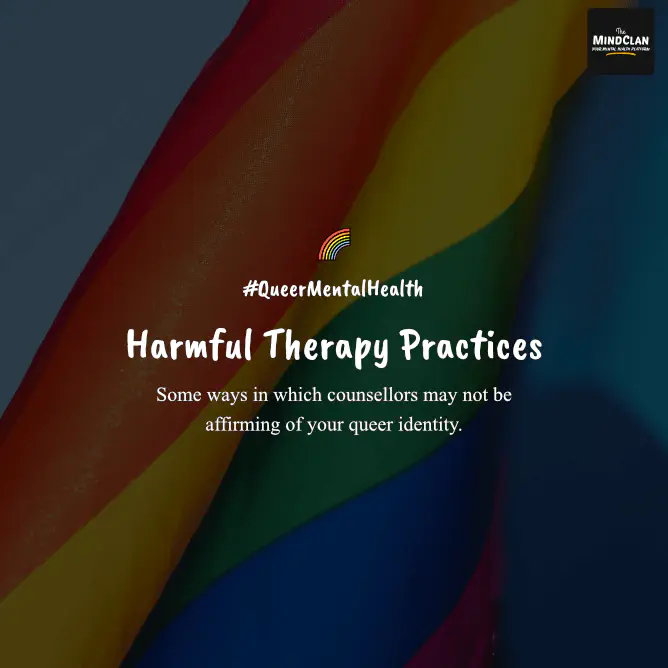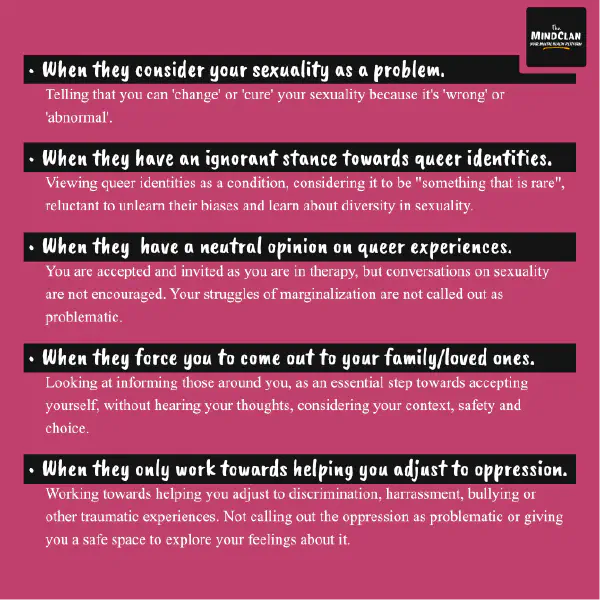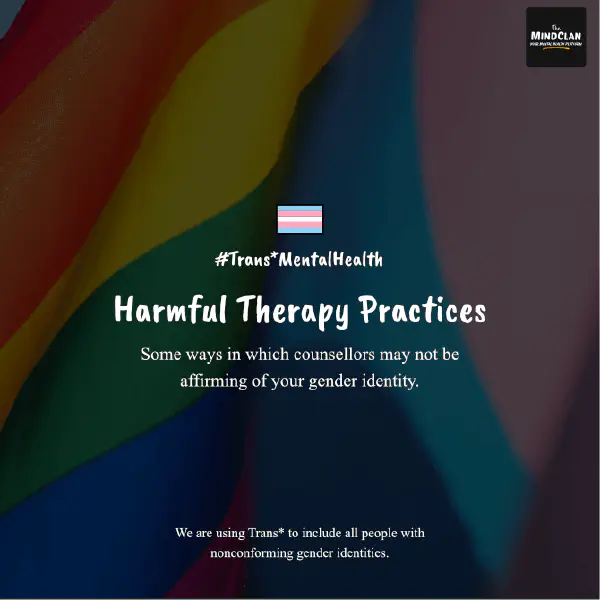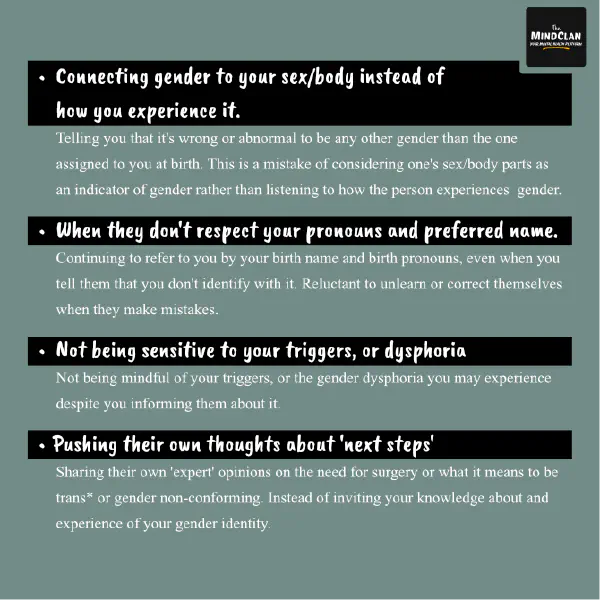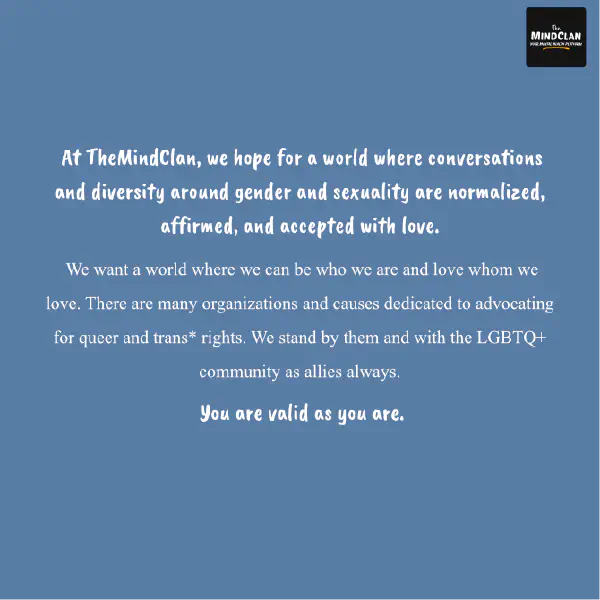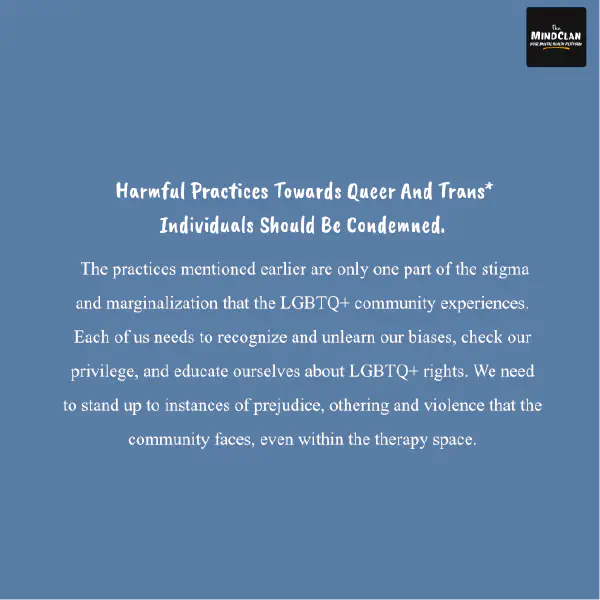May 17th is marked as the International Day Against Homophobia, Transphobia and Biphobia. On this day, 30 years ago, the World Health Organization (WHO) recognized that homosexuality is not a disease. As we celebrate the resilience of LGBTQ+ communities, we recognize that there is still a long way to go in the fight against discrimination.
🌈🌈🌈🌈🌈🌈🌈🌈🌈
We thank @mariwalahealth and the trainers at their queer affirmative counselling practice course for their knowledge and labour in helping us understand the differences between harmful, neutral and affirmative therapy for queer and trans* people.
At TheMindClan.com, we do not support these harmful practices in therapy mentioned above, including conversion therapy. It cannot be said enough that all genders and sexual identities are valid. There is nothing about them that needs change or cure.
Our hope remains alive for a world where we can be who we are and love whom we love. We want to work towards a mental health care system that is non-oppressive, inclusive, and affirming of all identities.
🌈🌈🌈🌈🌈🌈🌈🌈🌈🌈
If you identify as queer, trans*, and/or an ally and you’re looking for support and to connect, here are some amazing collectives that are fighting the good fight of advocating for queer and trans* rights. Follow and reach out to them to access affirmative resources and professionals:
- Varta Trust’s List of Queer Friendly Service Providers
- Mariwala Health Initiative’s list of Queer Affirmative MH Practitioners and Organizations (@mariwalahealth)
- Nazariya Queer Feminist Resource Group (@nazariya.qfrg)
- Yes We Exist (@yesweexistindia)
- The Plane Jar (@theplanejar)
- Thane Queer Collective (@thanequeercollective)
- Trans Men Collective (@transmencollective)
- Impulse Mumbai (@impulsemumbai)
- Umang Support Group (@umanglbt)
- SAAHAS Support Group (@saahastherapygroup)
Please leave names/handles of any collective you know that works with and for LGBTQ+ rights. 🌸
Image 1:
- QueerMentalHealth Harmful Therapy Practices. Some ways in which counsellors may not be affirming of your queer identity.
Image 2:
- When they consider your sexuality as a problem. Telling that you can ‘change’ or ‘cure’ your sexuality because it’s ‘wrong’ or ‘abnormal’.
- When they have an ignorant stance towards queer identities. Viewing queer identities as a condition, considering it to be “something that is rare”, reluctant to unlearn their biases and learn about diversity in sexuality.
- When they have a neutral opinion on queer experiences. You are accepted and invited as you are in therapy, but conversations on sexuality are not encouraged. Your struggles of marginalization are not called out as problematic.
- When they force you to come out to your family/loved ones. Looking at informing those around you, as an essential step towards accepting yourself, without hearing your thoughts, considering your context, safety and choice.
- When they only work towards helping you adjust to oppression. Working towards helping you adjust to discrimination, harrassment, bullying or other traumatic experiences. Not calling out the oppression as problematic or giving you a safe space to explore your feelings about it.
Image 3:
- Trans*MentalHealthHarmful Therapy Practices
Image 4:
- Connecting gender to your sex/body instead of how you experience it. Telling you that it’s wrong or abnormal to be any other gender than the one assigned to you at birth. This is a mistake of considering one’s sex/body parts as an indicator of gender rather than listening to how the person experiences gender.
- When they don’t respect your pronouns and preferred name. Continuing to refer to you by your birth name and birth pronouns, even when you tell them that you don’t identify with it. Reluctant to unlearn or correct themselves when they make mistakes.
- Not being sensitive to your triggers, or dysphoria Not being mindful of your triggers, or the gender dysphoria you may experience despite you informing them about it.
- Pushing their own thoughts about ’next steps’ Sharing their own ’expert’ opinions on the need for surgery or what it means to be trans* or gender non-conforming. Instead of inviting your knowledge about and experience of your gender identity.


